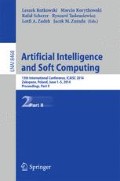Abstract
Since the emergence of Web 2.0, the idea of online knowledge sharing has been gaining attention of researchers and online communities. We can observe the popularity of such services on Wikipedia and numerous Q&A systems, in which ordinary users can explicitly ask questions and provide answers thus raise their expertise level by learning from others. Users dynamically switch between roles of content producer and content consumer. This paper applies game-theoretic approach to study how different community member profiles and reputation can affect the learning process and, in consequence, credibility of the provided information.
Research supported by the grant ”Reconcile: Robust Online Credibility Evaluation of Web Content” from Switzerland through the Swiss Contribution to the enlarged European Union.
Access this chapter
Tax calculation will be finalised at checkout
Purchases are for personal use only
Preview
Unable to display preview. Download preview PDF.
References
O’reilly, T.: What is web 2.0: Design patterns and business models for the next generation of software. Communications & Strategies (1), 17 (2007)
Bleicher, P.: Web 2.0 revolution: Power to the people. Applied Clinical Trials 15(8), 34 (2006)
Furtado, A., Andrade, N., Oliveira, N., Brasileiro, F.: Contributor profiles, their dynamics, and their importance in five q&a sites. In: Proceedings of the 2013 Conference on Computer Supported Cooperative Work, pp. 1237–1252. ACM (2013)
Pal, A., Chang, S., Konstan, J.A.: Evolution of experts in question answering communities. In: ICWSM (2012)
Pal, A., Konstan, J.A.: Expert identification in community question answering: exploring question selection bias. In: Proceedings of the 19th ACM International Conference on Information and Knowledge Management, pp. 1505–1508. ACM (2010)
Kostakos, V.: Is the crowd’s wisdom biased? a quantitative analysis of three online communities. In: International Conference on Computational Science and Engineering, CSE 2009, vol. 4, pp. 251–255. IEEE (2009)
Morrison, P., Murphy-Hill, E.: Is programming knowledge related to age? an exploration of stack overflow. In: Proceedings of the Tenth International Workshop on Mining Software Repositories, pp. 69–72. IEEE Press (2013)
Miller, F.J.: I= 0-(information has no intrinsic meaning). Information Research 8(1) (2002)
Sharratt, M., Usoro, A.: Understanding knowledge-sharing in online communities of practice. Electronic Journal on Knowledge Management 1(2), 187–196 (2003)
García-Carbonell, A., Watts, F., Montero, B.: Learning communities in simulation and gaming. Bridging the Gap: Transforming Knowledge into Action through Gaming and Simulation, 254–262 (2004)
Papaioannou, T.G., Aberer, K., Abramczuk, K., Adamska, P., Wierzbicki, A.: Game-theoretic models of web credibility. In: Proceedings of the 2nd Joint WICOW/AIRWeb Workshop on Web Quality, pp. 27–34. ACM (2012)
Leibowitz, N., Baum, B., Enden, G., Karniel, A.: The exponential learning equation as a function of successful trials results in sigmoid performance. Journal of Mathematical Psychology 54(3), 338–340 (2010)
Posnett, D., Warburg, E., Devanbu, P., Filkov, V.: Mining stack exchange: Expertise is evident from initial contributions. In: 2012 ASE International Conference on Social Informatics (2012)
Bosu, A., Corley, C.S., Heaton, D., Chatterji, D., Carver, J.C., Kraft, N.A.: Building reputation in stackoverflow: an empirical investigation. In: Proceedings of the Tenth International Workshop on Mining Software Repositories, pp. 89–92. IEEE Press (2013)
White, R.W., Richardson, M., Liu, Y.: Effects of community size and contact rate in synchronous social q&a. In: Proceedings of the SIGCHI Conference on Human Factors in Computing Systems, pp. 2837–2846. ACM (2011)
Anderson, A., Huttenlocher, D., Kleinberg, J., Leskovec, J.: Steering user behavior with badges. In: Proceedings of the 22nd International Conference on World Wide Web, International World Wide Web Conferences Steering Committee, pp. 95–106 (2013)
Barclay, P., et al.: Harnessing the power of reputation: strengths and limits for promoting cooperative behaviors. Evolutionary Psychology: An International Journal of Evolutionary Approaches to Psychology and Behavior 10(5), 868–883 (2011)
Author information
Authors and Affiliations
Editor information
Editors and Affiliations
Rights and permissions
Copyright information
© 2014 Springer International Publishing Switzerland
About this paper
Cite this paper
Kowalik, G., Adamska, P., Nielek, R., Wierzbicki, A. (2014). Simulations of Credibility Evaluation and Learning in a Web 2.0 Community. In: Rutkowski, L., Korytkowski, M., Scherer, R., Tadeusiewicz, R., Zadeh, L.A., Zurada, J.M. (eds) Artificial Intelligence and Soft Computing. ICAISC 2014. Lecture Notes in Computer Science(), vol 8468. Springer, Cham. https://doi.org/10.1007/978-3-319-07176-3_33
Download citation
DOI: https://doi.org/10.1007/978-3-319-07176-3_33
Publisher Name: Springer, Cham
Print ISBN: 978-3-319-07175-6
Online ISBN: 978-3-319-07176-3
eBook Packages: Computer ScienceComputer Science (R0)

